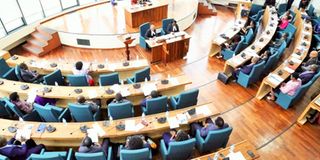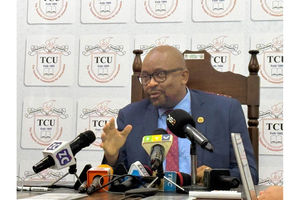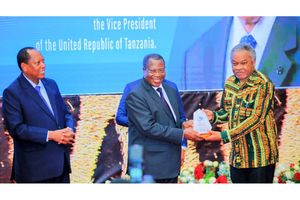EAC: Now defaulting member states to be sanctioned

The East Africa Legislative Assembly during a session in Arusha, Tanzania. PHOTO | FILE
What you need to know:
- Some member nations have not met their financial duties in terms of paying the community as required, but no affirmative action has been taken against such governments as per Article 143 of the EAC Treaty
Arusha. The members of the East African Community (EAC) have been cleared for possible sanctions for delayed contributions to the organisation’s kitty.
Rwanda, which joined the bloc in 2007, has also been commended for regularly honouring its financial obligations. This emerged during the tabling of a report on the state of the EAC finances to the just-ended session of the East African Legislative Assembly (Eala) in Bujumbura.
Kennedy Mukulia Ayason, the chairman of the House General Purpose Committee said the rest of the bloc’s member states were in the red over their obligations.
South Sudan, Burundi and the DR Congo have failed to meet financial obligations in terms of funding the Community as required, he said.
“The delay or non-remittance of funds by partner States negatively impacted the implementation of the planned EAC activities and programmes,” the lawmaker added.
Delayed or failed remittances, Mr Ayason further elaborated according to a dispatch to The Citizen, has significantly crippled the operations of the Community.
Over a couple of years the House has made several resolutions urging the EAC Council of Ministers to institute sanctions against countries which fail or delay remitting funds.
Yet no affirmative action has been made against states which defaulted as per Article 143 of the Treaty for the Establishment of the EAC.
MP Francine Rutazana from Rwanda regretted that only four partner states, including Tanzania, were timely paying remittances to the Community.
“They are paying not because they don’t have other priorities, but because they are committed to the EAC Treaty” she pointed out.
Article 143 of the seven-nation bloc stipulates that any partner state which defaults in meeting its financial and other obligations shall be subject to a punitive action.
Such action has to be taken by the Summit of Heads of States - the supreme organ of the EAC - on recommendation from the authoritative Council of Ministers.
“What is the issue for complying with this provision 143 of the Treaty, regarding the sanctions against the partner States which are not remitting on time?” she asked.
On his part, Mr Mukulia, a legislator from South Sudan, said the expenditure budget of the EAC has declined over the years. “For example, in 2006/07, the annual contribution per partner state stood at $8 million, but in 2019/20, the annual contribution had reduced to $6 million,” he stated.
The Chairperson of the Council of Ministers, Ezéchiel Nibigira, said member countries breaching the Treaty should be made accountable.
He revealed that the EAC secretariat, the executive organ of the Community, has been directed to swiftly act on the anomaly.
In this respect, the organ has been urged to convene a meeting of legal experts “so that they may be able to discuss the policy implications arising from the breaches of the Treaty.
, and sanctions to address delayed remittances.”
Mr. Nibigira, who doubles as the Burundi minister for the EAC Affairs added; “We are one people, and we have one destiny.
“There is no need to wait for sanctions, while there are other strategies we can use to help Partner States continue to contribute and make every effort for the smooth running of our Community,” he said.
Other speakers at the House session which was scheduled to end on Thursday reiterated calls to sanction countries that do not pay their financial contributions to the EAC.
They insisted that delayed or non- payment of remittances to the Community coffers has negatively affected “the life of the Community”.
The anomaly was exposed through the analysis report of the Committee on General Purpose on the EAC Annual Report 2019/2020, which was presented to just-ended House sitting.




